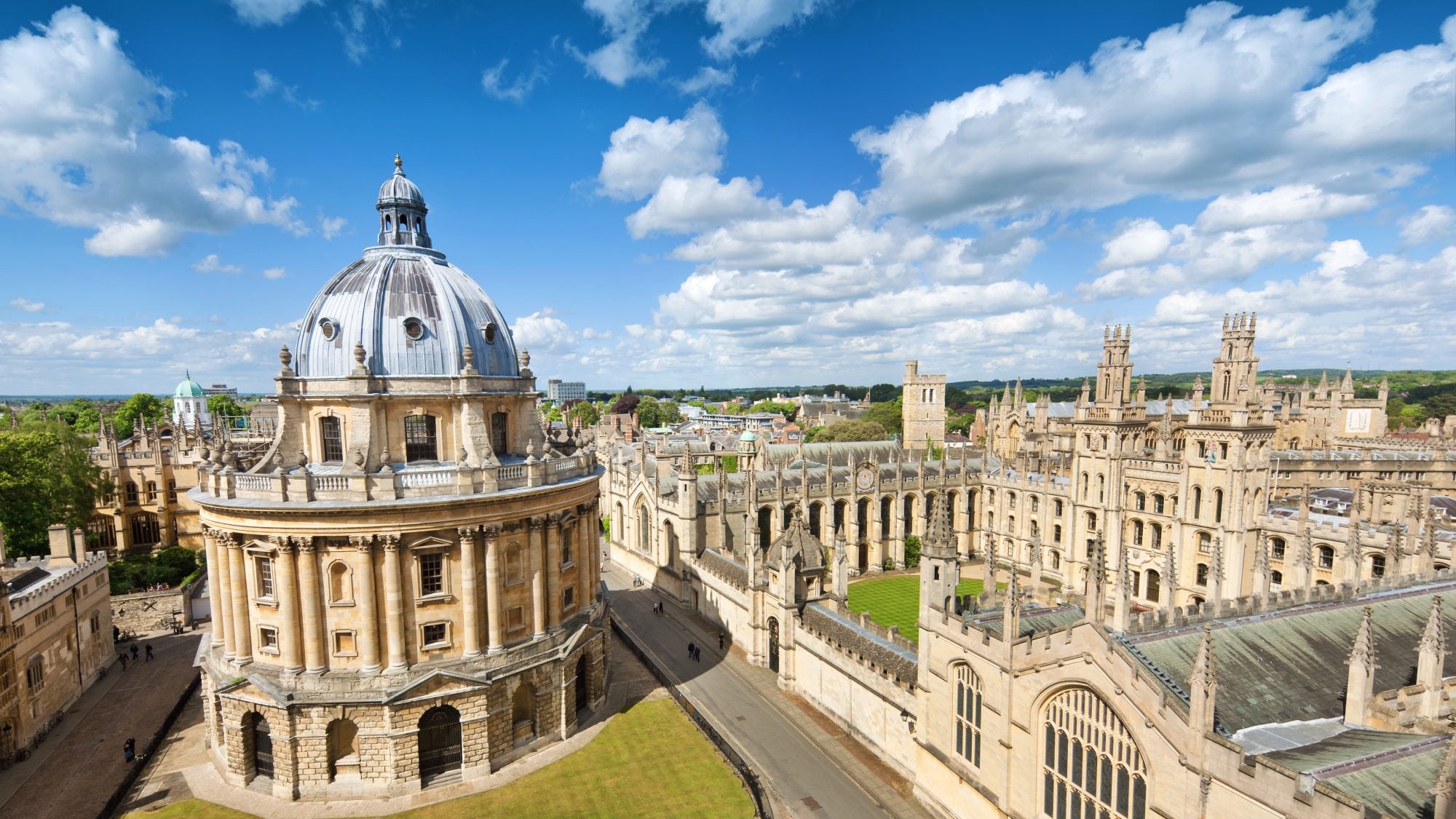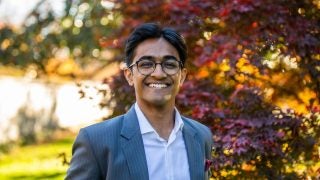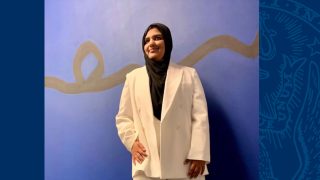Batterman joins Zhicheng (Charlie) Wang (SFS’22) and Asma Shakeel (SFS’24) as Georgetown’s 2024 Rhodes recipients. This is the first time in nearly 30 years that three scholars have been selected from Georgetown in the same year.
Batterman is among 32 recipients of the Rhodes in the U.S. He joins the ranks of more than 30 other Georgetown students and alumni who have received the scholarship, including last year’s two recipients, Atharv Gupta (SFS’23) and Isabella Turilli (SFS’22), and former President Bill Clinton (SFS’68).
The scholarship selects promising young people from around the world who demonstrate integrity, leadership, character, intellect and a commitment to service to study at the University of Oxford.
“The Rhodes Scholarship is a remarkable achievement. On behalf of our university, I wish to offer the sincerest congratulations to Thomas,” says Georgetown President John J. DeGioia. “Through his deep research and innovative approaches to the pursuit of knowledge, Thomas embodies a deep commitment to leadership, excellence and service to our world. We look forward to all that he will contribute in the years ahead.”
At Oxford, Batterman will pursue graduate degrees in Late Antique and Byzantine Studies and the History of War.
Batterman is a research specialist at the U.S. Department of Justice who works on a team investigating war crimes.
At Georgetown, he investigated centuries of writing to make new discoveries about an early medieval plague — a finding in his undergraduate thesis that garnered the Morris Historical Medal for best thesis from Georgetown’s History Department and helped shape an article that will be published in an academic journal next spring.
Batterman’s research methods — cross-examining primary sources, parsing through contradictory accounts — are the same skills he applies now in his daily work at the DOJ.
“Tommy is fervently committed to public service, has varied and unique interests, is respected by his peers, colleagues and professors, is a hard worker and unquestionably brilliant,” says Lauren Tuckley, director for the Center of Research and Fellowships.
Something New About an Old Plague
Batterman enrolled in the Georgetown course, “The Global History of the Plague,” in 2020. Midway through the semester, his class coincided with a real-life plague as COVID-19 struck.
Batterman would later begin researching a bubonic plague outbreak that many historians believed had hit in A.D. 565 and ushered in the fall of Byzantine northern Italy. Through the course and his research, he studied literary, palynological and paleogenomic sources, piecing together an interdisciplinary picture of a historic pandemic. He didn’t rely on one author’s historical account, but cross-examined sources, finding that certain Italian plagues likely did not take place when most historians thought and that centuries of historians had continuously revised the timeline.
“Most students who do well in this class know the readings and discuss them,” said Timothy Newfield, who taught Batterman twice and served as his thesis advisor and mentor. “Tommy, like the absolute best, did more: he challenged the readings. Reading them against each other, considering them in light of what we had already learned, he could dissect the articles. That his history honors thesis is about to be published in the Journal of Late Antiquity, a senior academic journal in Tommy’s field, is a testament to the quality of his work and his industry.”
Applying Coursework to the DOJ
In 2020, he began working at the Department of Justice (DOJ). Impressed by his research capabilities, quality of work and dedication, leaders at the DOJ promoted him to a research specialist, a role he began in September 2022 after graduating.
“I cannot stress enough how unusual it is for a recent college graduate to demonstrate so much intellectual and moral seriousness,” Christine Evans, a historian in the DOJ Criminal Division’s Human Rights and Special Prosecutions Section (HRSP), said. “My colleagues and I at HRSP have been astounded by the extraordinary energy, skill, and persistence Tommy brings to his work for our investigations.”
Batterman now works with historians, attorneys, and law enforcement partners to investigate and prosecute international war crimes. He supports the Ukraine War Crimes Accountability Team, often leading presentations on complex, technical subjects, Evans shared.
“Tommy is making a truly significant contribution to our investigations,” she said.
Eli M. Rosenbaum, director of Human Rights Enforcement Strategy and Policy at HRSP and lead on the DOJ’s War Crimes Accountability Team, shared that in his 38-year career at the DOJ pursuing accountability for war crimes and human rights violations, Batterman is one of “the most impressive college interns I have ever encountered.”
“It has been a joy to work with a young person whose passion for justice and fairness infuses both his professional and personal lives,” Rosenbaum said. “I have high expectations for Tommy’s future – as a leader whose leadership will be characterized by the same remarkable qualities that my colleagues and I have observed in him as a colleague at DOJ.”
Orangutans and Drumming
While at Georgetown, Batterman’s curiosity and interests extended beyond history. He was lead drummer in Georgetown’s Jazz Ensemble and managed Georgetown Cabaret. He also wrote articles on art and culture for The Georgetown Independent and was an editor for Utraque Unum, an undergraduate research journal on the humanities.
He now volunteers at DC’s National Zoo as a zookeeper aide in the primate unit, a position he started while a senior at Georgetown.
“In a city full of undergraduates who hope to make it big in politics, Tommy is of the rare sort who is driven by a deep-seated, carefully-contemplated, money-where-your-mouth-is commitment to public service and the common good,” said Rev. David Collins, SJ, who taught him in an upper-level undergraduate course on the history of astronomy as a first-year undergraduate and later became Batterman’s advisor for the history major.
Looking forward to Oxford, Batterman is eager to learn more and delve deeper into history, and to unearth new connections between past and present pandemics.



